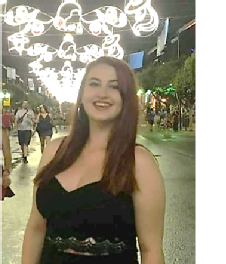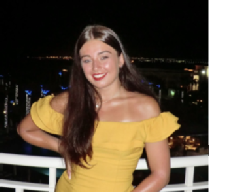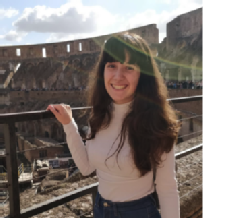Classics projects with the URSS 2021
Becca Battles
 Becca is a finalist at Warwick University studying Classical Civilisations, and is hoping to go on to do Postgraduate this coming academic year. Her main area of interest is ancient religion and she wrote her undergraduate dissertation on Persephone and her multiple personalities and representations.
Becca is a finalist at Warwick University studying Classical Civilisations, and is hoping to go on to do Postgraduate this coming academic year. Her main area of interest is ancient religion and she wrote her undergraduate dissertation on Persephone and her multiple personalities and representations.Katharine Broderick

Kat is now an MA student in Classics here at the University of Warwick. Her URSS project looks at the lessons we in the modern world can learn from Ancient Athenian Democracy, and particularly the solutions we can find by looking to Athenian democracy, for problems which still exist now. Barack Obama claims that we face a 'truth decay', a crisis of fact, where the truth is no longer important, rather, all that matters is the powers of persuasion. This is an issue which was certainly present in the 6th and 5th Centuries BC, which is the period Kat's project will focus on, and so her research will look to the problems this issue caused, and how we in the modern world can avoid them - if it is not already too late.
Through her project Kat has developed a great blog, Truth Decays, to help more people learn about the ancient world, and its relevance to modern life. You can link to Kat's blog here.
Kat is also the Producer of our upcoming production of The Bacchae which will be taking place in 2022.
Tallulah George

Tallulah is a third year Classical Civilisation student. Her research project is entitled ‘Museum Vlogs’ although Vlogs are just one element of her project. Over the summer of 2021 she interviewed experts at museums and ancient sites across the country, YouTube and TikTok videos as well as written reports discussing curators' favourite objects that they think should have more attention from the public. The aim of this project is to help make Classics more accessible and bring the field to a wider audience by publishing engaging interviews and object studies, simplifying and streamlining the facts. An important element in communicating these select pieces of information effectively is by demonstrating the impact they have on the modern world and thus emphasising how ancient studies should be more ‘mainstream’ to understand out modern world.
Out of this project Tallulah has created an incredible engaging website Classics by Tallulah.
Rebecca Preedy

Rebecca is a finalist studying Ancient History and Classical Archaeology with Study in Europe. Last year she spent her year abroad in Rome, where she continued to develop her passion for archaeology and material culture. Rebecca will be taking her love of the ancient world to a new level next year, with a taught MA in Ancient Visual and Material Culture of Rome here at Warwick. For her URSS project, Rebecca wanted to create something that would help local children develop an interest in archaeology and the romans. Her project, in conjunction with the department’s Roman Coventry Project, will see the creation of handling boxes in the form of Roman time capsules. Through liaison with museums in the Coventry area, these time capsules will contain real and replica objects associated with Roman Coventry that will be used in schools for hands-on educational sessions. There will also be an online version, with activities associated with the time capsules and the ‘characters’ who created them. Rebecca is hoping that this project will inspire children in the Coventry area to start thinking about the history and archaeology around them in a creative way and encourage their interest in the Roman world.
How to apply
The Undergraduate Research Support Scheme enables undergraduate students to carry out an interdisciplinary summer research/public engagement project. For further advice and support on public engagement initiatives please go to the WIE web page. The scheme is open to any UG student at Warwick of a full-time or part-time course, in any year including first and final year students. Exchange students are not eligible to apply. Applicants must get the support of academic supervisor and can apply for a URSS bursary to undertake their research project, either in the UK or abroad, for between 6-10 weeks. URSS application form Public engagement application form
URSS bursary
A URSS bursary contributes to your living expenses and other associated costs whilst carrying out your project. Each applicant can request up to a maximum amount of £1500 for home and overseas projects. In order to apply, you will be required to justify your bursary on the application form by providing a fully researched breakdown of projected costs. Bursary information
URSS Public Engagement Initiative
We are pleased to announce that the URSS will consider applications for Research + Public Engagement or Public Engagement only projects for the 2022 session. This may take one of two forms
1) A research project with a public engagement element . This means you would complete your research project first then design a public engagement activity to share your results. This activity may take place after the summer research period.
2) A public engagement-focused project. This could mean that you design an engagement initiative to share research, rather than doing the new research yourself.
If you would like to include a public engagement element please indicate this in your application. WIE can offer advice and support for public engagement and we strongly advise you to contact them before you make your application at https://warwick.ac.uk/wie/ or wie@warwick.ac.uk
